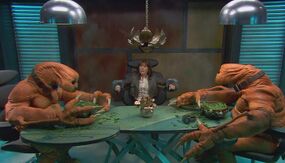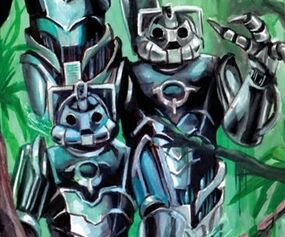Raxacoricofallapatorian: Difference between revisions
Tag: sourceedit |
m (getting rid of unnecessary name variable in infobox) Tag: apiedit |
||
| Line 2: | Line 2: | ||
{{Infobox Species | {{Infobox Species | ||
|image = Dark Slitheen.jpg | |image = Dark Slitheen.jpg | ||
|aka = | |aka = | ||
|affiliation = | |affiliation = | ||
Revision as of 18:43, 5 June 2017
The Raxacoricofallapatorians were a race from the planet Raxacoricofallapatorius.
Biology
External features
Raxacoricofallapatorians were large, bulky humanoids. They had large eyes and powerful arms with long claws. They had thick, lumpy skin, ranging in colour from a yellowish green, (TV: Aliens of London/World War Three) a paler, grey-green, (PROSE: The Monsters Inside) a much darker shade of green, (TV: The Nightmare Man) or a brownish orange. (TV: The Gift)
Raxacoricofallapatorians hatched from large, green eggs with several tendrils. (TV: Boom Town) By the age of twelve, Raxacoricofallapatorians were still considered children and were shorter than a human of equivalent age. (TV: Revenge of the Slitheen) As Raxacoricofallapatorians aged, they lost moisture from their tissue, calcifying and effectively turning into stone. (PROSE: The Slitheen Excursion)
Despite their large bulk, they were also capable of surprising speeds and could easily overpower a human. Raxacoricofallapatorians could hunt by scent and could identify an individual's species, age, sex, emotional state and location by it. This sense of smell was officially the best in the galaxy. (TV: Revenge of the Slitheen) They could also sense the pain of closely related individuals from far away. (TV: Aliens of London/World War Three)
Internal anatomy
Raxacoricofallapatorians were largely calcium-based life forms, (TV: Aliens of London) although in one account they were described as silicon-based. (PROSE: The Slitheen Excursion) Despite this, when posing as humans, they were able to eat carbon-based food, with some even enjoying it. (TV: The Gift) Due to their biochemistry, Raxacoricofallapatorians were vulnerable to acetic acid and would react explosively with it (TV: Aliens of London), a feature that was utilised in the Raxacoricofallapatorian death penalty. (TV: Boom Town)
Raxacoricofallapatorians had a more efficient metabolism than a human, meaning they only needed to eat every few weeks and produced less waste. Raxacoricofallapatorian blood was red and their tears were milky in colour and slightly acidic. (PROSE: The Monsters Inside) The females of the species could create poison when in danger, released either by a dart-like claw or through their breath. (TV: Boom Town) This breath could render a human unconscious. (COMIC: Doctormania)
Raxacoricofallapatorians lived in the chalky hills and the tall tree forests of Raxacoricofallapatorius. They froze and calcified on ice planets. (GAME: Plant and Animal Habitats) There also were at least two oceans on the planet, in which the Raxacoricofallapatorians swam. (WC: Alien File: Blathereen)
Technology
The Slitheen and other criminals from the same race were scavengers, known for stealing advanced technology from other species. (TV: Revenge of the Slitheen) They were more advanced than humans and had developed faster-than-light travel in the form of slipstream engines sometime prior to 2006. They could also modify a pig into a humanoid form using their own technology. (TV: Aliens of London/World War Three) They also had small, hand-held teleportation devices, though they tended to have limited range and capabilities. (TV: Boom Town, TV: The Gift) Some of the Raxacoricofallapatorian technology appeared organic in nature. While in Justicia, Ecktosa and Dram used sticky nets as hammocks. These nettings were covered in a slime that quickly hardened away from body heat. Other Raxacoricofallapatorian buildings had their floors covered in a sticky substance. (PROSE: The Monsters Inside) In the 347th century, the Raxacoricofallapatorians also had molecular repurposing devices. (PROSE: The Slitheen Excursion)
The Raxacoricofallapatorians' most distinguishable technology was their compression fields. The Slitheen (TV: Aliens of London/World War Three) and Blathereen families (PROSE: The Monsters Inside) were able to disguise themselves as other, smaller humanoids by fitting into their skins. This was done with the compression-field collars that they wore on their necks. When unzipped, pent-up energy was released through the zip in the form of a flickering blue light. Their size was controlled by the movement of gas, which caused a condition similar to farting, but with a smell slightly similar to that of bad breath due to calcium decay. (TV: Aliens of London/World War Three) These individuals originally needed to be large, but the advancement of technology meant smaller skins could be used. (TV: The Lost Boy, PROSE: The Monsters Inside) These skin suits were apparently inferior to those of other species. (PROSE: The Nightmare of Black Island)
The Raxacoricofallapatorians mastered the concept of string theory. (TV: Revenge of the Slitheen)
Culture
Raxacoricofallapatorian society was based off families, such as those of the Slitheen, Blathereen, Slavereen, Caizeen, Lilieen, Rackateen, Chippeen, Fittereen, Hanazeen, Glizeen, Hostrozeen and Arlene. Raxacoricofallapatorian names were complex with the various hyphenation showing their exact placement on the family lines. (WC: Captain Jack's Monster Files) There were also mixed families, such as the Slitheen-Blathereen family (TV: The Gift) or the Hanazeen-Blathereen family (PROSE: A Comedy of Terrors). According to Bloorm Vungah Bart Slitheen, the bartleboigle tree was used to displine children, by spanking their backsides. (TV: The Lost Boy) Raxacoricofallapatorians were led by a Grand Council and an Assembly. (TV: Revenge of the Slitheen) The leader of this Council was the Lord Predator. (PROSE: The Slitheen Excursion)
Unlike the Slitheen and Blathereen families most Raxacoricofallapatorians were a peaceful race that taught their children maths and poetry. they made their home world a paradise for them and other peace loving species and some of them were brilliant farmers but they despise criminal members of their species and punish them without mercy.
The Raxacoricofallapatorians had the death sentence for dangerous criminals like the Slitheens, which was carried out in a gruesome way. The criminal would be lowered into a cauldron of acetic acid, which would then be heated to boiling. The acidity of the solution was formulated to dissolve the skin, allowing the internal organs to drop into the liquid while the condemned was still alive, resulting in a slow and painful death. (TV: Boom Town)
Based on the comments of Blon, Raxacoricofallapatorians neither brushed their teeth nor prepared their food in complicated ways. (TV: Boom Town)
Two known Raxacoricofallapatorians insults were "May plaque brown your belly" and "May your mother boil in the cauldron of atonement". Both were presumably related to their calcium based biology. (PROSE: The Monsters Inside)
History
In 1903, after receiving a wealth of information from the future, Grigori Rasputin saw people made of calcium. (AUDIO: The Wanderer)
Raxacoricofallapatorians were part of the four-world Raxas Alliance along with the Abzorbalovians and the people of Raxacoricovarlonpatorius and Clix. (TV: The Gift)
Sometime before the 21st century the criminal Slitheen family bribed their way into power on Raxacoricofallapatorius. Their rule crashed the planet's economy and eventually the population rose up against them. (TV: The Gift) Exposed, shamed, and arrested in the Great Purge of Yon:556, the entire family was tried and found guilty with no chance of appeal and given the death sentence. Many of the Slitheen fled justice, but the family continued to be hunted down by the Blathereen family and Judoon. The actions of the Slitheen ruined the good name of the Raxacoricofallapatorians. (TV: Revenge of the Slitheen)
The Slitheen family preyed on other planets, especially Earth for many centuries.
- See the Slitheen page for a more thorough history.
In the 347th century, Raxacoricofallapatorians (possibly just the Slitheen) fought in the Platonic War, alongside various other alien races, against the human race.
In the year 34,600, the Lord Predator was Haralto Wong Bopz Wim-Waldon Arlene. However he died shortly after this. (PROSE: The Slitheen Excursion)
Alternate timeline
In an alternate timeline the Cybermen, using Borg technology conquered Raxacoricofallapatorius and converted the entire populace into Cybermen. (COMIC: Assimilation²)
In a timeline created by a continuity bomb where the Doctor embraced the title of "Time Lord Victorious" and became a mad tyrant who ruled over time and space, a Raxacoricofallapatorian shot him dead without regeneration. (COMIC: Four Doctors)
Minor references
Rose Tyler remarked the Abzorbaloff was "a bit Slitheen", but when the Doctor asked he revealed that he was from Clom, Raxacoricofallapatorius' twin planet. The Abzorbaloff spoke of the Raxacoricofallapatorians with contempt. (TV: Love & Monsters)
The Tenth Doctor, having assumed the identity of John Smith, drew a picture of the Slitheen in A Journal of Impossible Things. (TV: Human Nature)
A Raxacoricofallapatorian was seen at the Zaggit Zagoo bar where the Tenth Doctor went to visit Jack Harkness one last time before his regeneration. (TV: The End of Time)
In 1903, after receiving a wealth of information from the future, Grigori Rasputin foresaw, among other things, creatures made of calcium. (AUDIO: The Wanderer)
Behind the scenes
Abandoned plans
- Before the Ood were created, the production team had considered Slitheen being the servants on Sanctuary Base 6 in The Impossible Planet/The Satan Pit. (The Complete History, volume 53)
- In the Shadow Proclamation scene in The Stolen Earth, Raxacoricofallapatorians were originally going to appear along with a child version of Blon. Strangely, the sketch depicted them as having four fingers rather than three as seen on TV. (REF: Doctor Who: The Writer's Tale)
The Visual Dictionary
The non-narrative source Doctor Who: The Visual Dictionary gave further information about Raxacoricofallapatorian biology and culture. It said they were well adapted to their home-planet, with large eyes to see through the blizzards of the poles and powerful arms to swim through the oceans and to hatch from their eggs. While hunting, they would use their strength and poison-tipped claws to kill their prey.




